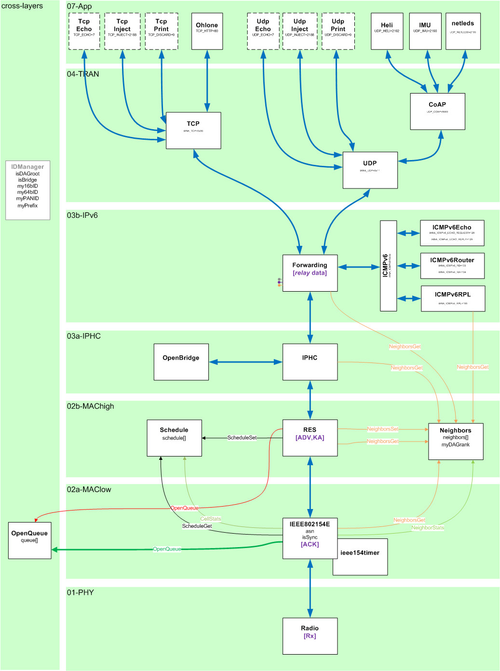Stack Integration
Stack Integration
The reference implementation of IEEE802.15.4e provided here is part of the OpenWSN stack implementation. Now, while the IEEE802154E.c file does not contain any hardware-dependent functions, it does depend on a couple of modules around it, which we list in this page.
Overview
The image on the right shows the stack organization of OpenWSN. While you can use the IEEE802.15.4e in a different stack/OS, this figure gives you a clear idea of what needs to go "around" IEEE802.15.4e, in terms of layers and modules.
The link layer consists of two sublayers:
- "02a-MAClow" is the "lower MAC". It consists of the IEEE802.15.4e implementation and the associated timer. IEEE802.15.4e feeds from the queue of packets to be sent (the
OpenQueuemodule), and the schedule (in thescheduleschedule). It runs entirely in ISR (interrupt service routine) mode and "executes" the schedule without modifying it - "02b-MAChigh" is the "upper MAC" which is responsible for managing the schedule. It runs entirely in task mode (same goes for everything in the stack except IEEE802.15.4e)
In the source code, you will find a folder structure which mimics the layers at openwsn.
Dependencies
The reference code for the IEEE802.15.4e is at IEEE802154E.c. It calls functions from the different modules. These are implemented in OpenWSN. You're free to either reuse them, or implement them in your stack/OS. Most likely, you'll already have very similar functionality.
radio
The radio driver and IEEE802.15.4e work close together because they create the interface between the stack and the hardware. This module is detailed in TschRadio.
ieee154etimer
The timer and IEEE802.15.4e work close together since many of the function calls have to be tightly timed. This module is detailed in TschTimer.
IEEE802154
This module 's only functionality is to parse and add IEEE802.15.4 headers. It contains no state. It implements the following functions IEEE802.15.4e calls:
ieee802154_prependHeaderwhich adds a IEEE802.15.4 header to the front of the packet;ieee802154_retrieveHeaderwhich parses the IEEE802.15.4 header from a packet and returns its fields.
For a detailed description of this module, look at:
openqueue
This module manages a pool of OpenQueueEntry_t buffers. It implements the following functions IEEE802.15.4e calls:
openqueue_getFreePacketBufferreturns a points to a unusedOpenQueueEntry_tbuffer, orNULLif they're all being used;openqueue_freePacketBufferinstructs the module that thisOpenQueueEntry_tbuffer is no more needed; the module then frees it;openqueue_getAdvPacketreturns anOpenQueueEntry_tbuffer which contains an advertisement packet, orNULLif there are none;openqueue_getDataPacketreturns anOpenQueueEntry_tbuffer which contains a data packet destined to a particular neighbor, orNULLif there are none.
For a detailed description of this module, look at:
idmanager
This module keeps track of the mote's addresses. It implements the following functions IEEE802.15.4e calls:
idmanager_getIsDAGrootreturnTRUEif the mote is the time master,FALSEotherwise;idmanager_getMyIDreturns the mote's address (PANID (Previous Access Network Identifier), 16-bit or EUI-64 (Extended Unique Identifier));idmanager_isMyAddressreturnsTRUEif the address passed as a parameter is the mote's,FALSEotherwise.
For a detailed description of this module, look at:
openserial
This module is used to print messages through the serial port. It implements the following functions IEEE802.15.4e calls:
openserial_printErrorprints an error message over the mote's serial port;openserial_stopinstructs the serial module to stop sending/receiving;openserial_startOutputinstructs the serial module to start outputting bytes.
For a detailed description of this module, look at:
schedule
This module stores the IEEE802.15.4e schedule. It implements the following functions IEEE802.15.4e calls:
schedule_getTypereturns the type of slot the current slot is (reception, transmission, advertisement, etc.);schedule_getNeighborreturns the neighbor associated with the current slot;schedule_getChannelOffsetreturns the channel offset associated with the current slot.
For a detailed description of this module, look at:
sixtop
This module manages the IEEE802.15.4e schedule and serves as a pass-through between IEEE802.15.4e and the upper layer. It implements the following functions IEEE802.15.4e calls:
task_sixtopNotifSendDone indicates IEEE802.15.4e is done sending a packet generated by an upper layer;
task_sixtopNotifReceive indicates IEEE802.15.4e received a packet for an upper layer.
For a detailed description of this module, look at:
packetfunctions
This module is a container for miscellaneous useful functions. It does not contain any state. It implements the following functions IEEE802.15.4e calls:
packetfunctions_isBroadcastMulticastreturnsTRUEif the address passed as a parameter is a broadcast address,FALSEotherwise;packetfunctions_sameAddressreturnsTRUEif the two addresses passed as parameters are the same,FALSEotherwise;packetfunctions_reserveHeaderSizechanges thepayloadandlengthfields of anOpenQueueEntry_tbuffer to leave space for a header at the beginning of a packet;packetfunctions_reserveFooterSizechanges thepayloadandlengthfields of anOpenQueueEntry_tbuffer to leave space for a footer at the end of a packet;packetfunctions_tossHeader"removes" the header at the beginning of a packet by changing the thepayloadandlengthfields of anOpenQueueEntry_tbuffer;
For a detailed description of this module, look at:
leds
This module drives the LEDs of the board. It implements the following functions IEEE802.15.4e calls:
LED_D1_ONturns on the LED labeled "D1";LED_D1_OFFturns off the LED labeled "D1".
For a detailed description of this module, look at:

